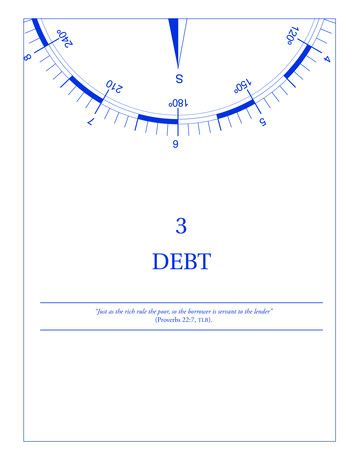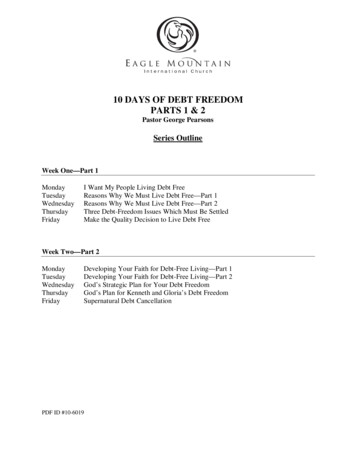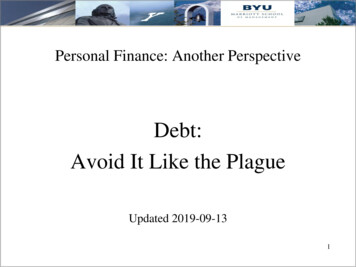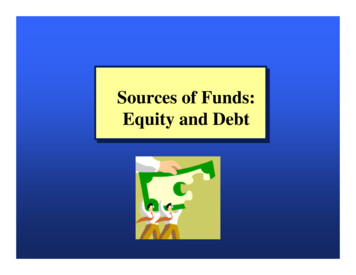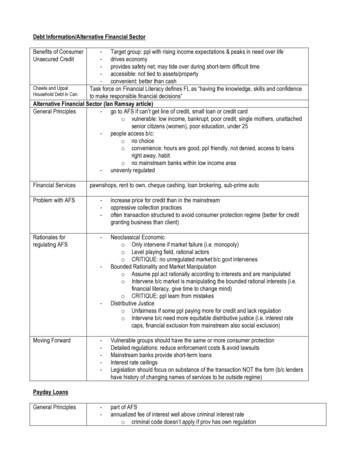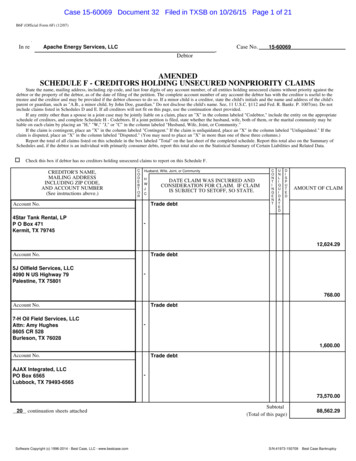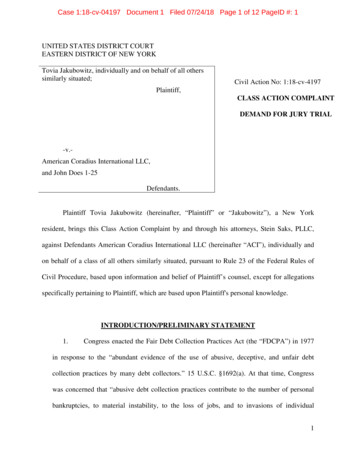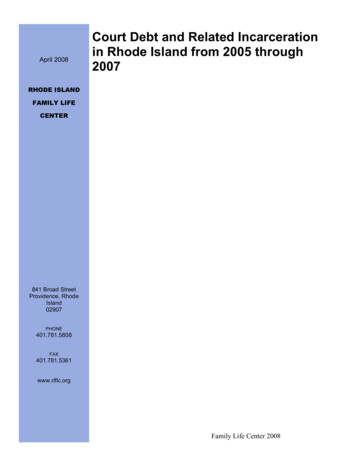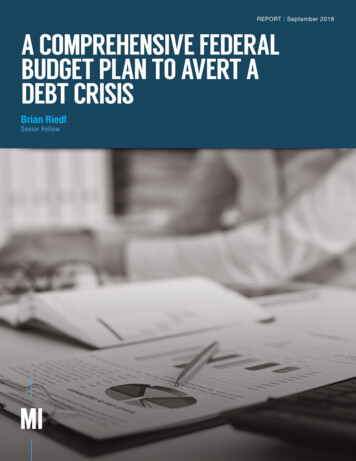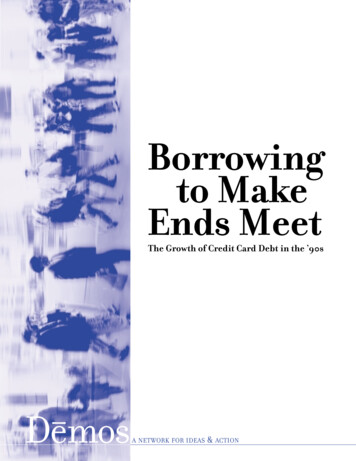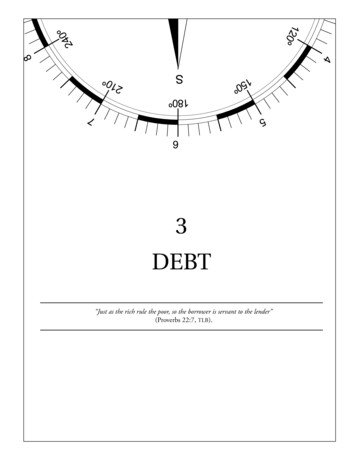
Transcription
3DEBT“Just as the rich rule the poor, so the borrower is servant to the lender”(Proverbs 22:7, TLB).
NAVIGATING YOUR FINANCESDEBTHomework for Week 3Scripture to Memorize:“Just as the rich rule the poor, so the borrower is servant to the lender” (Proverbs 22:7, TLB).Let’s Get Practical! Begin working with the Compass—finances God’s wayTM Map on pages 73-75. Complete the List Your Debts & Snowball ‘em! on pages 76-80. Continue 30 Day Tracking of your income and spending on pages 44-45.Day One (Debt)Complete the Compass Map and List Your Debts & Snowball ’Em! on pages 76-80.1. Do you have any questions about the map or List Your Debts & Snowball ’Em?50
DEBT2. What did you learn from completing them, and how will you use this knowledge?Read Deuteronomy 15:4-6; Deuteronomy 28:1-2, 12 and Deuteronomy 28:15, 43-45.3. According to these passages how was debt viewed in the Old Testament, and what was the reason aperson got into debt (became a borrower) or got out of it (became a lender)?4. What is your view of debt and how do you feel about your debt situation?Day Two (Debt)Read Romans 13:8 and Proverbs 22:7.1. Is debt encouraged in the Bible? Why?Romans 13:8—51
NAVIGATING YOUR FINANCESProverbs 22:7—2. How do these verses apply to you personally and to your business, if you have one?3. If you are in debt, are you committed to get out of it? If you have a plan to eliminate it, pleasedescribe the plan.Day Three (Debt Repayment)Read Psalm 37:21 and Proverbs 3:27-28.1. What do these verses say about debt repayment, and why do you think God gave us these principles?Psalm 37:21—Proverbs 3:27-28—52
DEBT2. Is this how you repay your debt? If not, what steps will you take to begin?Day Four (Getting out of debt)Read 2 Kings 4:1-7.1. What principles on getting out of debt can you identify from this passage?2. How can you apply them to your current situation?53
NAVIGATING YOUR FINANCESDay Five (Cosigning)Read Proverbs 22:26-27 and Proverbs 17:18.1. What does the Bible say about cosigning (striking hands, surety) and how does this apply to you?Proverbs 22:26-27—Proverbs 17:18—Read Proverbs 6:1-5.2. If someone has cosigned, what should he or she attempt to do?54
DEBTDay Six (the Notes)Read the Debt Notes on pages 56-72.1. What did you learn about debt that proved to be especially helpful?2. How will you implement what you learned?3. I will take the following action as a result of this week’s study:Please write your prayer requests in your prayer log before coming to class.55
NAVIGATING YOUR FINANCESDEBT NOTESPlease read after completing Day 5 homework.The amount of debt in our nation has exploded—government debt, business debt, and personal debt. Weare drowning in an ocean of red ink. More than 1 million individuals a year file bankruptcy. And evenmore sobering, a Gallup Poll found that a majority of divorces are caused in part by financial tension inthe home.These sorts of financial tensions often result from believing the “Gospel According to MadisonAvenue.” You’ve heard it ten thousand times: Buy now and pay later with easy monthly payments. We allknow that nothing about those monthly payments is easy. Advertisers fail to tell us the whole truth, leaving out one little word—Debt.WHAT IS DEBT?The dictionary defines debt as “money that a person is obligated to pay to another.” Debt includes bankloans, money borrowed from relatives, the home mortgage, past-due medical bills, and money owed tocredit card companies. Bills that come due, such as the monthly electric bill, aren’t considered debt ifthey’re paid on time.WHAT DEBT REALLY COSTSWe need to understand the real cost of debt. Assume you have 5,560 in credit card debt at an 18percent interest rate. This would cost you 1,000 in interest annually. Check out the chart below.56
DEBT1. Amount of interest you paidYear 10Year 20Year 30Year 40 10,000 20,000 30,000 40,0002. What you would accumulate on 1,000 invested annually earning 10 percentYear 10Year 20Year 30Year 40 17,072 63,286 188,386 527,0393. How much the lender earns from your interest payment at 18 percentYear 10Year 20Year 30Year 40 23,521 146,628 790,948 4,163,213You can see what lenders have known for a long time: the eye-popping impact of compounding interestworking for them. If they earn 18 percent, they will accumulate more than 4 million on your 1,000 ayear for 40 years! Is it any wonder credit card companies are eager for you to become one of theirborrowers?Now compare the 40,000 you paid in interest over 40 years with the 527,039 you would haveaccumulated if you had earned 10 percent on 1,000 each year. The monthly income on 527,039earning 10 percent—without ever touching the principal—is 4,392!Debt has a much higher cost than many realize. Stop to consider this: When you assume debtof 5,560 and pay 1,000 a year in interest versus earning a 10 percent return on that 1000, it actuallycosts you 527,039 over 40 years. The next time you find yourself tempted to purchase something withdebt, ask yourself if the long-term benefits of staying out of debt outweigh the short-term benefits of thepurchase.THE OTHER COSTS OF DEBTDebt often increases stress, which contributes to mental, physical, and emotional fatigue. It can stiflecreativity and harm relationships. Many people raise their lifestyle through debt, only to discover that itsburden then controls their lifestyle.57
NAVIGATING YOUR FINANCESWHAT THE BIBLE SAYS ABOUT DEBTWhile Scripture doesn’t specifically call debt a sin, it strongly discourages it.Remember, God loves us and has given us these principles for our benefit. Read the first portion of Romans 13:8 from several different translations: “Owe no man anything” (KJV). “Let no debt remain outstanding” (NIV). “Pay all your debts” (TLB). “Owe nothing to anyone” (NASB). “Keep out of debt and owe no mananything” (Amplified). Any questions about God’s view of debt?Here’s why the Lord wants you debt-free.1. DEBT IS CONSIDERED SLAVERY.Proverbs 22:7 reads: “Just as the rich rule the poor, so the borrower is servant to the lender” (TLB). Whenwe’re in debt, we’re a servant to the lender. And the deeper we are in debt, the more like servants webecome. We don’t have the freedom to decide where to spend our income, because it’s already obligatedto meet our debt payments.In 1 Corinthians 7:23, Paul writes, “You were bought with a price; do not become slaves of men.”Our Father made the ultimate sacrifice by giving His Son, the Lord Jesus Christ, to die for us. And Henow wants His children free to serve Him rather than lenders.2. DEBT WAS CONSIDERED A CURSE.In the Old Testament, being out of debt was one of the promised rewards for obedience.“If you diligently obey the Lord your God, being careful to do all His commandments which I command youtoday, the Lord your God will set you high above all the nations of the earth. All these blessings will come uponyou . You shall lend to many nations, but you shall not borrow” (Deuteronomy 28:1-2, 12, emphasisadded).On the other hand, debt was listed among the curses for disobedience. “If you do not obey theLord your God, to observe to do all His commandments and His statutes with which I charge you today, thatall these curses will come upon you and overtake you . The alien who is among you shall rise above you higherand higher, but you will go down lower and lower. He shall lend to you, but you will not lend to him; he shallbe the head, and you will be the tail” (Deuteronomy 28:15, 43-44).In God’s view, then, being in debt moves you from a head position in life to the tail end!58
DEBT3. DEBT PRESUMES UPON TOMORROW.When we get into debt, we’re assuming that we will earn enough in the future to repay it. But can wereally assume such a thing? We plan for our jobs to continue or our investments to be profitable. TheBible strongly cautions us against such presumption: “You who say, ‘Today or tomorrow, we shall go to suchand such a city, and spend a year there and engage in business and make a profit.’ Yet you do not know whatyour life will be like tomorrow . Instead, you ought to say, ‘If the Lord wills, we shall live and also do this orthat’” (James 4:13-15).4. DEBT MAY DENY GOD AN OPPORTUNITY.Financial author Ron Blue tells of a young man who wanted to go to seminary to become a missionary.The young man had no money and thought the only way he could afford seminary was to secure a student loan. However, this would have left him with about 40,000 of debt by the time he graduated. Heknew a missionary’s salary would never be able to repay that much debt.After a great deal of prayer, he decided to enroll without the aid of a loan, trusting the Lord tomeet his needs. Several years later, he graduated without borrowing anything. Just as important, he hadgrown in his faith and in his appreciation for how God could provide his needs. This was the mostvaluable lesson learned in seminary as he prepared for life on the mission field.BORROWINGThe Bible is silent on when we can owe money. In our opinion, it is permissible to owe money for ahome mortgage or for your business or vocation. This “permissible debt,” however, should meet threecriteria. The item purchased should be an asset, with the potential to appreciate or produce an income. The value of an item must exceed the amount owed against it. The debt should not be so high that repayment puts undue strain on the budget.As we’ve seen during the financial and real estate crisis, there are no guarantees that home values willalways appreciate or that businesses will always be profitable. So, here’s the rule of thumb if you take onpermissible debt: borrow as little as possible and pay it off as quickly as possible!59
NAVIGATING YOUR FINANCESHOW TO GET OUT OF DEBTThere are three basic steps for you to become debt-free: (1) pray, (2) increase your monthly surplus, and(3) follow the Compass map. Remember, the goal is D-Day—Debtless Day—when you become totallyfree of debt!1. HOW TO GET OUT OF DEBT – PRAY!In 2 Kings 4:1-7, we read about a widow threatened with losing her sons to an aggressive creditor. Whenshe asked the prophet Elisha for help, he told her to borrow many empty jars from her neighbours. Thenthe Lord multiplied her only possession—a small amount of oil—until all the jars were filled to the brim.She sold the oil and paid her debts to free her children.The same God who provided supernaturally for the widow is interested in freeing you from debt.And He is every bit as able of meeting your needs as He was the needs of that poor widow. The first step isto pray. Seek the Lord’s help and guidance in your journey toward Debtless Day. He may act immediatelyor slowly over time. In either case, prayer is essential. A trend is emerging. As people begin to eliminatedebt, even little by little, the Lord blesses their faithfulness. Even if you can afford only a small monthlyrepayment of your debt, do it. The Lord is fully able to multiply your efforts.2. HOW TO GET OUT OF DEBT – INCREASE MONTHLY SURPLUSThe larger your monthly surplus, the more money you can have available to pay down your debt. Howdo you increase that surplus? By increasing your income, reducing spending, and selling items you nolonger need.Earn additional income.Many people hold jobs that simply don’t pay enough to allow them to pay off their debts quicklyenough. A temporary part-time job—or some creative way to earn more money—can make a hugedifference in how fast you can reach D-Day.Spend less by becoming content with what you have.Advertisers use powerful methods to get us to buy. Frequently the message is intended to foster discontentment with what we have. An example is the American company that opened a new plant in CentralAmerica because the labour was relatively inexpensive. Everything went well until the villagers receivedtheir first paycheck; afterward they didn’t return to work. Several days later, the manager went down to60
DEBTthe village chief to determine the cause of this problem. The chief responded, “Why should we work? Wealready have everything we need.” The plant stood idle until someone came up with the idea of sending amail-order catalog to every villager. There hasn’t been an employment problem since!Note these three realities of our consumer-driven economy. The more television you watch or surfing the Web you do, the more you spend. The more you look at catalogs and magazines, the more you spend. The more you shop, the more you spend.There is an interesting passage in 1 Timothy 6:5-6: “ Godliness actually is a means of great gain whenaccompanied by contentment.” When we are content with what we have and wait to buy until we can do itusing cash—that is great gain.Consider a radical change in lifestyle.A growing number of people have lowered their standard of living significantly to get out of debt morequickly. Some have downsized their homes, rented apartments, or moved in with family members. Manyhave sold cars with large monthly payments and purchased inexpensive ones for cash. In short, they havetemporarily sacrificed their standard of living so they could pay off debt more quickly. Radio host DaveRamsey says it this way: “If you live like no one else, later you can live like no one else.”Sell what you’re not using.Evaluate your possessions to determine whether you should sell any of them to help you get out of debtmore quickly. What about the clothes you no longer wear? Those fishing rods gathering dust? Is thereanything you can sell to help you get out of debt?3. HOW TO GET OUT OF DEBT – FOLLOW THE Compass—finances God’s way MapTMThe Compass map on pages 73-75 will help you determine which debts you ought to pay off first. AtDestination 2, you focus on paying off your credit cards, because they usually have the highest interestrate. At Destination 3, you will wipe out your consumer debt: car loans, student loans, home equityloans, medical debts, and so forth. And at Destination 5, you begin to accelerate the payment of yourhome mortgage.61
NAVIGATING YOUR FINANCESWhen the credit card statements arrived, it signaled the beginning of averbal war between Alex and NancyPopovich. They carried seven cardsbetween them, and were using cashadvances from some to satisfy the minimum monthly payments on others.The Popoviches aren’t alone.The average household with an unpaidbalance has more than 9,300 in creditcard debt. There has been an explosionin the number of credit cards for onlyone reason: The credit card companiesmake a ton of money charging high interest! The more you owe, the more interest they receive—and the more likelythey can whack you with late fees andover-the-limit penalties.Following are a few simple suggestions for paying off the plastic.Snowball the plasticSnowball your way out of debt. And here’s how. In addition to making the minimum payments on allyour credit cards, focus on paying off the smallest-balance-card first. You’ll be encouraged to see its balance go down, down, and finally disappear!After the first credit card is paid off, apply its payment toward the next-smallest one. After thesecond card is paid off, apply what you were paying on the first and second toward the third-smallest.That’s the snowball in action!When you’re on a roll like this, it starts getting exciting. Those “impossible” balances that haveworried you and robbed you of your peace will begin diminishing before your very eyes. So where doyou start? Prioritize your debts on the Debt List on pages 76-80. And every time you pay one of thosecards off, use it as an occasion to celebrate and thank the Lord!Perform plastic surgeryWhen people use credit cards rather than cash, they spend about one-third more. Why? Because it just62
DEBTdoesn’t feel like “real money”; it’s just plastic. As one shopper said to another, “I like credit cards morethan money because they go so much further!” If you don’t pay the entire credit card balance at the endof each month, you may need to perform some plastic surgery—any good pair of scissors will do!We started with nine credit cards. Today we carry two that we pay in full each month. To limitthe temptations of additional cards, we opted out of receiving credit card offers by mail and telemarketing calls. To stop Addressed Admail, call the Canadian Marketing Association - Do Not Mail Service 416391-2362 Log on to the the Web site of the National Do Not Call Registry at www.lnnte-dncl.gc.ca to stoptelemarketers. Evening time will be much more peaceful without answering those irritating calls.Everyone should do this!Lower the interest rateThere is a lot of competition among credit card companies for your business—and especially if you havea solid credit score. If your company is charging a high interest rate, phone and ask them to drop it. Youmay have to call several times, but75 percent of the time, they’ll lowerthe rate.Another alternative is totransfer the balance to a card thatcharges less interest. Beforeswitching to a lower-rate card,however, confirm that the new cardhas no transfer fee, no annual fee,and that the interest rate ontransferred balances is not higherthan the advertised rate. Butremember, if you miss a payment ormake a payment late, your interestrate will automatically skyrocket inmost cases.At Destination 3, you’ll focus onpaying off consumer loans, and oneof the most common is auto debt.Seventy percent of all cars are financed, and many people never get out of car debt. It’s one of the biggestobstacles for most people on their journey of financial faithfulness. Fortunately, there’s a way to get outof car debt for good by following these three steps.63
NAVIGATING YOUR FINANCES Decide to keep your car at least three years longer than your car loan—and then pay off the loan. After your last payment, keep making the same payment, but pay it to yourself. Put it into anaccount that you will use to buy your next car. When you’re ready to replace your car, the cash you have saved plus your car’s trade-in valueshould be sufficient to buy a car without credit. It may not be a new car, but a low-mileage usedcar is a better value anyway.Upside downYou’ve probably heard it said again and again: The moment you drive a car off the lot it’s worth less thanyou paid for it. It’s so true. That “new car smell” may be pleasant, but it’s also incredibly expensive. Rapiddepreciation is why so many new car buyers find themselves upside down on their auto loans—owingmore than the car is worth. Look at the graph to see how quickly cars lose value.Can you believe it! The average car loses a whopping 40 percent of its value the first year—and 60percent by year four. In other words, a new 28,000 car will lose about 17,000 of value in the first fouryears you own it. To get the same result, you could toss a 100 bill out the car window once a week!For this reason, early in our marriage, Bev and I decided to buy only reliable used cars for cash—and drive them until the wheels fall off! Bev drove the same car for seventeen years. We used to call it64
DEBT“Puff” because of the smoking exhaust pipe whenever she accelerated.I once bought a truck that cost only a hundred dollars—and it looked it! A sympatheticneighbour borrowed it and brought it back, painted. (Suddenly it looked like a two hundred dollartruck!) While driving the truck one morning, I was enjoying a time of special worship and rememberedPsalm 16:11: “In the presence of the Lord is fullness of joy.”You know what? In that moment, it didn’t matter whether I was driving my hundred-dollarclunker or the most expensive car on the market; I could experience fullness of joy because of myrelationship with Jesus Christ.Advertisers have led us to believe that our deepest needs can be satisfied only by purchasing thenewest and the best. Nothing could be further from the truth.It’s hard to overestimate the financial impact of driving debt-free cars. The average monthly newcar payment is 375. If a 21-year-old drives debt-free cars and saves the 375 a month, earning anaverage return, he or she will accumulate about 4 million by age 65! Short-term spending sacrificestranslate into enormous long-term benefits.My advice: keep your cars as long as they are safe to drive, and buy low-mileage used cars toavoid new car depreciation.Snowball consumer debtAfter you have paid off your auto loans, focus on paying off your consumer debts in exactly the sameway as you wiped out your plastic—snowball ’em. Make the minimum payments on all your consumerdebts, but focus on accelerating the payment of your smallest consumer debt first. Then, after you payoff the first consumer debt, apply its payment toward the next-smallest one. After the second one is paidoff, apply what you were paying on the first and second to pay off the third, and so forth.At Destination 5, you will begin paying off your home mortgage. If you haven’t yet purchased a homeand want to, there are two rules of thumb for buying an affordable home:First, put a minimum of 20 percent down payment. This will eliminate the need for expensivePMI insurance, which doesn’t benefit you at all. And forget adjustable-rate mortgages; get one that’s fixed65
NAVIGATING YOUR FINANCESrate. If you don’t yet have enoughsaved for 20 percent down,renting usually is much cheaperthan owning. So rent—and savelike crazy.Second, no more than 40percent of your income shouldbe spent for all housing expenses,including mortgage payments,insurance, real estate taxes, utilities, and maintenance. If housingcosts exceed 40 percent, you’llfind yourself continually robbingmoney from other spendingcategories to balance your budget.PAYING OFF THE HOME MORTGAGEWhen Bev and I learned God’s financial truths, we became convinced that the Lord wanted us entirelyout of debt, even our home. We understood this to be a really long-term goal because of the size of ourmortgage. But we also realized that if we could pay it off, it would free up a big chunk of our income, sothat we could give more generously and save more aggressively.We didn’t start prepaying the mortgage until we wiped out all our credit card and consumerdebt. Then we focused on the home by paying an extra amount each month to reduce the principal morequickly. The longer we did it, the more excited we became. Finally, we also started applying work bonusesand income tax refunds to our mortgage.Prepaying your mortgage can save you tons of interest. Log on to www.compasscanada.org andclick on “Resources” to learn how much interest you can save by paying extra toward principal eachmonth. If you’ve never looked at a chart like this before, it will knock your socks off.Once you have decided to pay off your home, let your lender know, so they can tell you how toget proper credit for your prepayment.Some homeowners don’t want to prepay the mortgage and decrease the interest payments, reasoning that interest is one of their biggest tax deductions. But this tax advantage is overrated. If you arein the 25 percent tax bracket, for each 1,000 you pay in home interest, you save only 250 in taxes—25percent of the 1,000 interest paid. So while there is a tax benefit, it’s not as much as many think. Paying 1,000 to save 250 is not that great a deal.66
DEBTAs Bev and I discovered, paying off our home mortgage was a key step on the journey to financial faithfulness.INVESTMENT DEBTShould you borrow money to make an investment? In our opinion, it is permissible to borrow for an investment, but only if the investment (along with your down payment) is the sole collateral for the debt.You should not personally guarantee repayment of the debt. At first, this may appear to contradict thebiblical admonition to repay our debts. But let’s explore this further.Suppose you wanted to purchase a rental property with a reasonable down payment, makingsure that the house would be the sole security for the debt. You would explain to potential lenders that atyour option, you would repay the loan in one of two ways: First, by giving the lender cash—making thepayments. Or second, by giving the lender the property plus the down payment and any other moneyyou had invested in the house.Given those options, the lender must make a decision. Is the down payment sufficient? Is therental property of adequate value?Some investors have responded that it’s impossible to locate a lender willing to loan without apersonal guarantee. That, however, has not been my experience. When I was in the real estate business, Iprayed for this type of financing and then knocked on lots of doors. Eventually I got it.Because of the possibility of difficult financial events over which you have no control, be sure tolimit your potential loss to the cash you invest and the asset itself. It’s painful to lose your investment,but it’s much more serious to jeopardize your family’s needs by risking all your personal assets oninvestment debt.BUSINESS DEBTWe also want to encourage you to pray about becoming debt-free in your business. Many businessowners are recognizing the competitive advantage and increased stability they enjoy when they eliminatebusiness debt.Here is our rule of thumb on business debt: Use as little as possible and pay it off as quickly aspossible.67
NAVIGATING YOUR FINANCESCHURCH DEBTThe Bible doesn’t specifically address whether a church may borrow money to build or expand its facility.In our opinion, such debt is permissible if the church leadership clearly senses the Lord’s leading to do so.If a church borrows, we recommend that it raise as much money as possible for the down payment andestablish a plan to pay off the debt as rapidly as possible. A growing number of churches have chosen tobuild without the use of any debt. For many of these churches, the members’ faith has increased as theyhave observed the Lord providing the necessary funds, and they have been encouraged to become debtfree themselves.DEBT REPAYMENT RESPONSIBILITIESPrompt paymentMany people delay paying creditors until payments are past due, even when they have the money. Onthis practice, however, the Bible is crystal clear. In Proverbs 3:27-28 we read: “Do not withhold good fromthose to whom it is due, when it is in your power to do it. Do not say to your neighbour, ‘Go, and come back,and tomorrow I will give it,’ when you have it with you.”Godly people should pay their debts and bills as promptly as they can. Some try to pay each billthe same day they receive it, to demonstrate to others that knowing Jesus Christ has made them financially responsible.Using your savingsIn our opinion, it’s not smart to use all your savings to pay off debt. Follow the Compass map, and keepthree months’ living expenses set aside for emergencies.BankruptcyA court can declare people bankrupt and unable to pay their debts. Depending on the type of bankruptcy, the court will either allow them to develop a plan to repay their creditors or it will distribute theirproperty among the creditors as payment.Should a godly person declare bankruptcy? Generally, no. Psalm 37:21 tells us, “The wicked borrows and does not pay back.”However, in our opinion, bankruptcy is permissible under two circumstances: When a creditor or circumstances force a person into bankruptcy. There are occasions when bankruptcy68
DEBTis the only viable option when the financial challenges become too extreme to reverse.That option needs to be exercised only after all others have been explored. When the emotional health of the borrower is at stake. If the debtor’s emotional health is at risk because of inability to cope with the pressure of aggressive creditors, bankruptcy can be an option.Declaring bankruptcy should never be a cavalier decision, because it remains on a credit report for upto ten years, and often impact one’s ability to obtain future credit at reasonable interest rates. Potentialemployers and landlords are also likely to learn of a past bankruptcy. It can haunt people for years, andalthough it provides relief, it’s not exactly the fresh start that some advertise.After a person goes through bankruptcy, he should seek counsel from an attorney to determine ifit’s legally permissible to repay the debt, even though he is not obligated to do so. If it’s allowable, everyeffort should be made to repay the debt. For a large debt, this may be a long-term goal that is largelydependent upon the Lord supernaturally providing the resources.COSIGNINGCosigning relates to debt. Anytime you cosign, you become legally responsible for the debt of another. It’s justas if you went to the bank, borrowed the money, and gave it to your friend or relative who is asking youto cosign. In effect, you promise to pay back the entire amount if the borrower does not.A Federal Trade Commission study found that 50 percent of those who cosigned for bank loansended up making the payments. And 75 percent of those who cosigned for finance company loans endedup making the payments! Those are pretty good odds that if you cosign, you’ll pay. The casualty rate is sohigh because the professional lender knows the loan is a bad risk, and told himself, I won’t touch this loanwith a ten-foot pole unless I can get someone who is financially responsible to guarantee its repayment.Fortunately, the Bible gives us clear direction about cosigning. Proverbs 17:18 says, “It is poorjudgment to countersign another’s note, to become responsible for his debts” (NLT). The words “poor judgment” are literally translated “destitute of mind”!A parent often cosigns for his or her child’s first automobile. We decided not to do this. Wewanted to model for our children the importance of not cosigning, and to discourage them from usingdebt. Instead, we encouraged them to think ahead and save for the purchase of their first cars.Already cosigned?If you have already cosigned for a loan, the Scripture has counsel for you, too. Get out of it as fast as you can!Proverbs 6:1-5 says, “Son, if you endorse a note for someone you
Any questions about God’s view of debt? Here’s why the Lord wants you debt-free. 1. DEBT IS CONSIDERED SLAVERY. Proverbs 22:7 reads: “Just as the rich rule the poor, so the borrower is servant to the lender” (TLB). When we’re in debt, we’re a servant to the lender. And the deeper we are in

